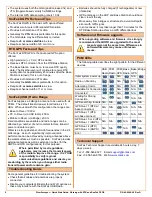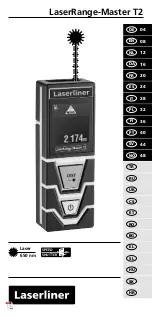
2 RiverSurveyor
– Quick Start Guide: Working with RTK and SonTek DPGS P/N 45-0040-08 Rev D
The system uses both the GGA (position-based fix) and
VTG (Doppler-based velocity fix) NMEA strings
The internal GPS data sampling rate is 10 Hz
SonTek DGPS Facts and Tips
The SonTek DGPS is the basic GPS option offered.
Provides a sub-meter differential GPS solution
Provides both GGA and VTG data
Generally the
VTG
data is preferable for this option
The GGA data may be differentially corrected
Requires
6 or more satellites
in view
Requires channel width of 20 m or more
RTK GPS Facts and Tips
The SonTek RTK GPS is the advanced GPS option
offered.
High precision (+/- 3 cm) RTK solution
Receives RTK correction from the RTK Base Station
The Base Station must be on to receive RTK quality
data. The RiverSurveyor will continue to receive RTK
quality data for approximately 45 minutes after the Base
Station is turned off or is out of range.
Provides both GGA and VTG data
Generally the
GGA
data is preferable for this option
Requires
8 or more satellites
in view
Requires channel width of 1 m or more
SonTek (USB) Radio Range
SonTek supplies a 2 dBi gain antenna to be used with all
PCMs. The default transmit power for all radios is 10
dBm. When used with this configuration, the ranges are:
Base to Rover: 1000 m
PC to Rover (via USB radio): 450 m
Mobile to Rover (via Bridge): 200 m
Field conditions are variable and radio ranges can be
affected by a number of environmental factors, transmit
power and antenna gain.
Water is a strong absorber of radio frequencies in the 2.4
GHz range. As such, significantly improved radio
performance can be achieved by raising antennas above
the water surface as much as possible. SonTek provides
external antennas as well as extension cables (for the
DGPS and RTK configurations) for this purpose.
Where permitted by local regulations,
customers may increase the transmit power
of the radio to improve the range. It is YOUR
responsibility to verify regional
communication regulations and ensure you
are abiding by them when you change either radio
transmit power and/or antenna gain.
Troubleshooting Guide
Some general guidelines for troubleshooting the system:
Check that all cables and antennas are properly
connected
Disable your computer’s Bluetooth and Wi-Fi options as
these may interfere with the SonTek USB Radio.
Batteries should be fully charged (if rechargeable) or new
(if alkaline)
GPS antennas on the ADP and Base Station should have
clear view of the sky
Move away from bridges or structures to avoid multi-path
errors with GPS signal.
In some cases, it may take longer than 10 minutes for the
RTK Base Station to achieve a GPS differential lock.
Software and Firmware upgrade
When upgrading software and firmware, it is strongly
recommended that BOTH are upgraded to the most
recent version at the same time. Differences in
software/firmware may cause unforeseen
issues.
PCM LEDs
The following table describes the light pattern for the different
devices.
USB
Radio
PCM
Radio
PCM
GPS
Base
Radio
Base
GPS
Bridge
Initial system power up
N/A
N/A
Radio on Stand-by
Slow Slow
N/A
Slow
N/A
Slow
Attempting Comm.
N/A
N/A
Available for Connection
N/A
N/A N/A
Connected
N/A
N/A
Waiting for Pairing
Connection
N/A
N/A
N/A N/A
GPS searching for sats. N/A N/A
N/A
N/A
GPS Qual. 1 (RTK w/
base connection)
N/A N/A
N/A
N/A N/A
GPS Qual. 1 (RTK
w/o base connect.)
N/A N/A
N/A
N/A N/A
GPS Qual. 5 or 2 (RTK)
GPS Qual. 1 (DGPS)
N/A N/A
N/A
N/A
GPS Qual. 4 (RTK)
GPS Qual. 2 (DGPS)
N/A N/A
N/A
N/A
Error
Technical Support
SonTek Technical Support is available 24 hours a day, 7
days a week.
Tel: +1-858-546-8327 Email:
Fax: +1-858-546-8150 Web:




















